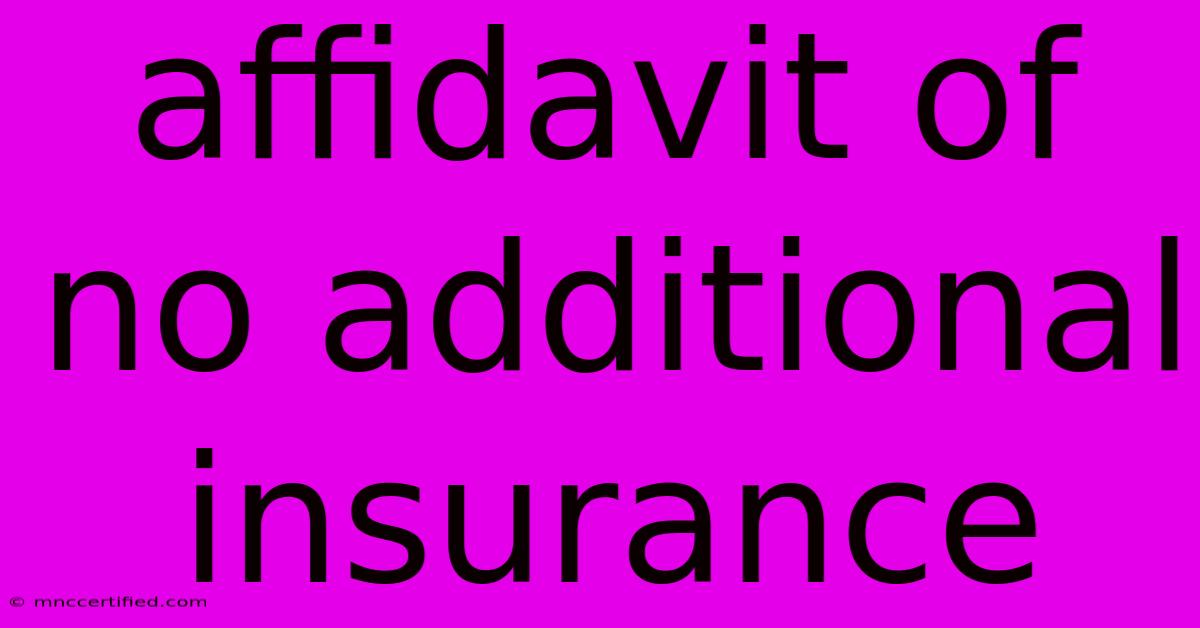Affidavit Of No Additional Insurance

Table of Contents
Understanding the Affidavit of No Additional Insurance: A Comprehensive Guide
An Affidavit of No Additional Insurance is a legal document that confirms the absence of any additional insurance policies beyond what's already been disclosed. It's a crucial document in various situations, particularly in legal proceedings, insurance claims, and real estate transactions. This guide will provide a comprehensive overview of the affidavit, its purpose, and when it's required.
What is an Affidavit of No Additional Insurance?
An Affidavit of No Additional Insurance is a sworn statement, typically notarized, declaring that the affiant (the person signing the affidavit) doesn't hold any additional insurance policies relevant to the specific situation at hand. This statement is made under oath, meaning the affiant is legally bound to tell the truth.
Purpose of an Affidavit of No Additional Insurance
The primary purpose of this affidavit is to ensure transparency and prevent potential fraud. It serves several key functions:
- Insurance Claims: When filing an insurance claim, the insurer might require an affidavit to confirm that you haven't obtained additional coverage that could potentially duplicate benefits. This helps prevent fraudulent claims and ensures fair compensation.
- Real Estate Transactions: In real estate transactions, the affidavit can be requested to verify that the property owner doesn't have any additional insurance policies covering the property beyond the primary coverage. This information is crucial for buyers to understand the potential risks and liabilities involved.
- Legal Proceedings: In lawsuits, an affidavit of no additional insurance can be submitted to prove that the defendant doesn't have any additional insurance policies that could cover potential damages or liabilities.
When is an Affidavit of No Additional Insurance Required?
Here are some common scenarios where an Affidavit of No Additional Insurance may be required:
- After an Accident: If you're involved in an accident and your insurance company suspects you might have additional coverage, they may request this affidavit.
- During a Claim: If you're filing a claim, the insurance company might require the affidavit to ensure transparency and prevent potential fraud.
- Real Estate Closing: When purchasing a property, the lender or title company might request the affidavit to confirm the absence of any additional insurance policies related to the property.
- Legal Disputes: In lawsuits, the court might require the affidavit from both parties to assess their potential financial resources and liabilities.
Key Elements of an Affidavit of No Additional Insurance
A standard affidavit typically includes the following elements:
- Affiant's Name and Address: Complete details of the individual making the sworn statement.
- Statement of Truth: A clear and concise statement affirming that the affiant doesn't hold any additional insurance policies related to the specific situation.
- Specific Coverage: The affidavit should clearly specify the type of insurance being addressed, e.g., auto insurance, health insurance, or homeowner's insurance.
- Date and Time of Signing: The affidavit should be dated and signed by the affiant.
- Notary Public Signature: The affidavit should be notarized to certify the affiant's identity and the validity of the statement.
Conclusion
The Affidavit of No Additional Insurance is a critical document that plays a vital role in various legal and financial contexts. Understanding its purpose and the circumstances when it's required can help individuals navigate these situations efficiently. Remember to consult with an attorney or insurance professional for specific guidance and advice relevant to your situation.

Thank you for visiting our website wich cover about Affidavit Of No Additional Insurance. We hope the information provided has been useful to you. Feel free to contact us if you have any questions or need further assistance. See you next time and dont miss to bookmark.
Featured Posts
-
Week 10 Falcons Saints Locker Room Insights
Nov 11, 2024
-
Did Taylor Swift Attend Chiefs Broncos
Nov 11, 2024
-
Standard Vs Enhanced Title Insurance
Nov 11, 2024
-
Kilmarnock At Celtic Team News Update
Nov 11, 2024
-
Mowbrays Thank You To Sunderland After Exit
Nov 11, 2024